Rieder’s Richter Scale: Freestyle Relay Classic Showdown Erases Shiny Suit Record

Editorial content for the 2019 World Championships coverage is sponsored by FORM Swim Goggles.
See full event coverage.
Follow FORM on Instagram at @FORMSwim #swimwithform

Each day during the FINA World Swimming Championships, Swimming World will present “Rieder’s Richter Scale,” an analysis of the impact of each swimming final on the sport’s wider landscape: “1” indicates just a minor tremor, while a “10” means a race brought massive upheaval. freestyle relay
Even ten years after the banishment of so-called “shiny suits,” the polyurethane bodysuits that helped knock off 42 world records at the 2009 World Championships in Rome, you don’t have to look too far to see the lingering impact of the technology on the sport. Consider that heading into Thursday’s finals at this year’s meet in Gwangju, three of the five finals sported world records dating back to 2009.
One of those records, the women’s 200 fly, still sits far beyond the reach of any non-rubber-suited swimmer, while another, the men’s 100 free, survived by far its most fierce assault. But a third, the last of the women’s relay marks to survive the decade, went down in a showcase for the ages, a rare case of two exquisite relay squads executing to perfection.
Australia looked the part of gold-medal favorite in the 4×200 freestyle relay, with Ariarne Titmus, in the midst of a career meet after winning gold in the 400 free and silver in the 200 free, and relay extraordinaire Emma McKeon leading the way. The Aussies lost 20-year-old Shayna Jack, third at the country’s Trials in 1:56.37, to withdrawal weeks before the meet, but Brianna Throssell and Madison Wilson picked up the slack with 1:56 splits in qualifying.
Meanwhile, the United States brought a long tradition of 4×200 freestyle relay success, with victories in Olympic Games on five of six occasions since the event made its debut in 1996 and seven wins in the last eight World Championships. The only Worlds blemish came in 2009, when China out-lasted a U.S. squad and set the world record that would survive the decade at 7:42.08.
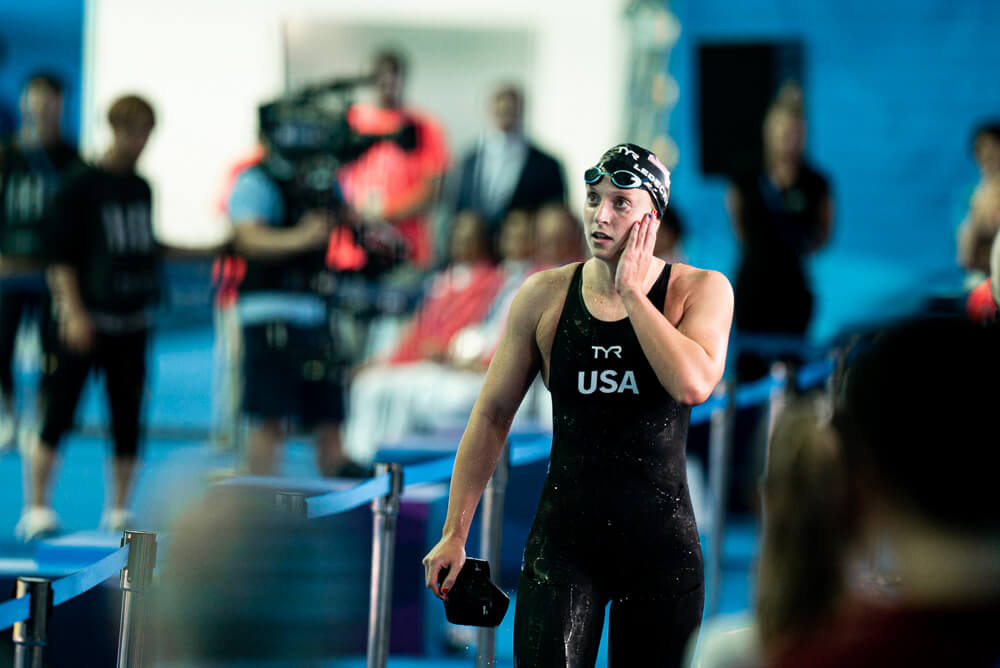
Katie Ledecky — Photo Courtesy: Becca Wyant
U.S. golden performances at both the 2016 Olympics and 2017 World Championships had scared the record, only to fall just short, but the U.S. coaching staff had tough decisions to make in putting together the 2019 squad. Katie Ledecky had fallen ill and missed both the 1500 free and 200 free. Allison Schmitt wasn’t performing anywhere close to her 2018 form, when she swam as fast as 1:55.82.
So Greg Meehan and the rest of the U.S. staff settled on this order: Simone Manuel, Ledecky, Melanie Margalis and Katie McLaughlin. Manuel, Meehan’s own swimmer at Stanford, had never broken 1:57 in the event. Margalis had posted the top split on the U.S. prelims relay at 1:56.37. McLaughlin wasn’t technically qualified for the event, but a 1:55-mid split at Pan Pacs last year earned her the nod—for anchor responsibilities.
Australia and the U.S. submitted their lineups, stepped up to the blocks and provided a thing of beauty. Titmus led off in 1:54.27, faster than her silver medal-winning time from the 200 free, but Manuel swam a lifetime best of 1:56.09 to stay close. Ledecky shook off the effects of her illness to put the U.S. in front with a 1:54.61. Throssell and Margalis each split 1:55s on the third leg, and the U.S. went in for the anchor leg with a lead of nine hundredths.
And then, McKeon vs. McLaughlin, McKeon the experienced 200 freestyler who tied for silver at the 2017 World Championships and McLaughlin a 4×200 freestyle relay veteran herself but never the anchor of an international relay. McKeon went out hard, and McLaughlin fought back. On the third 50, she pulled nearly even, but despite the grittiest of efforts, McKeon’s closing burst of speed would get the job done.
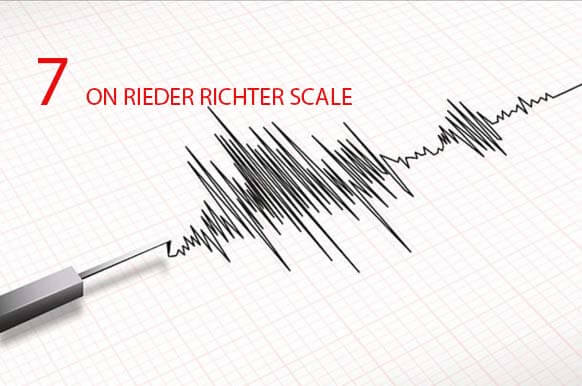
Somehow, the world record almost became an afterthought as McKeon and McLaughlin battled, but the times on the board showed Australia at 7:41.50 and the United States at 7:41.87, the two fastest relays ever, both under that shiny suit world record.
The final results, Australia first, the U.S. second and Canada third, came as a surprise to few, but brilliant strategy for both teams, brilliant execution for all eight swimmers and the destruction of a decade-old world record defined the last race of night five. Plus, Ledecky seems to be back healthy and racing, a positive sign for Friday’s 800 free. That earns the women’s 4×200 free relay a 7 on the Richter scale.
How often does a swimming race hyped up to the maximum live up to every bit of anticipation? (Rhetorical, but not very often.) Well, just about everyone expected an epic showdown between Caeleb Dressel and Kyle Chalmers in the men’s 100 free with the world record on high alert, and that’s exactly what we got.
There was the Dressel show, out in 22.29 and back in 24.67 for a 46.96, the third-fastest performance in history and the first sub-47 since 2009. When Dressel won his first 100 free world title two years ago in Budapest, he got out ahead and then sustained his massive power to pull away at the very end. Same thing here, except no pulling away. Not with Chalmers reeling him in.
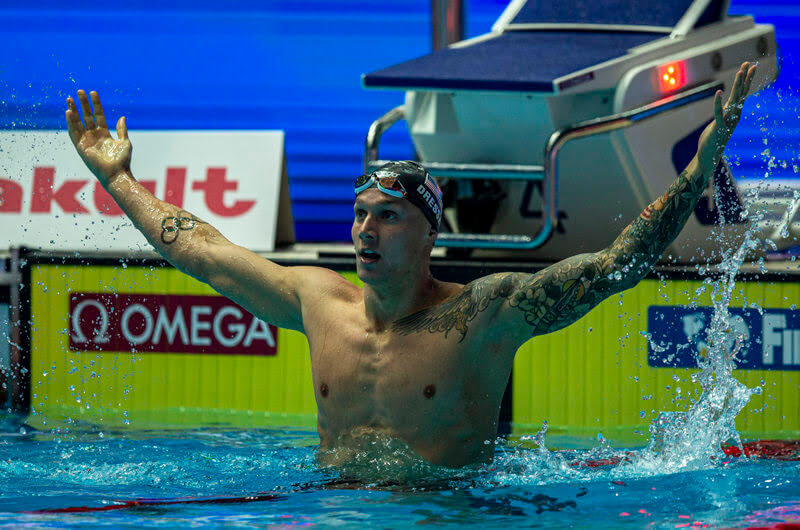
Caeleb Dressel celebrates an historic win – Photo Courtesy: Patrick B. Kraemer
Third at the halfway point in 22.79, a half-second behind Dressel, Chalmers finished in 24.29 to very nearly take away the gold medal. Chalmers settled for a 47.08, the sixth-fastest mark ever.
After touching the wall, Dressel and Chalmers smiled and embraced, and then Dressel climbed onto the lane line to raise his arm in celebration. He knew that he had recorded arguably the most impressive 100 free ever and that he had needed every bit of it to take down another great champion.
“Goodness,” Dressel told NBC in a post-race television interview. “He’s certainly not someone to be taken lightly, and I mean that. I respect the crap out of him. What he’s done, I consider him a better 100 freestyler. I really do. I look up to him in that aspect. I know I have to keep working because he’s going to be there no matter what time I go, and I know that.”
Oh yeah, he’s going to be there. Like next year at the Tokyo Olympics, the real prize that both have had their eyes on the whole time. In an interview last month, Chalmers told Swimming World, “I’m going to look at my results this year and I guess be disappointed or satisfied with it, but I know that next year, I really want to see gold.”

Dressel? He told NBC that he only had “a couple more minutes to be excited, and then it’s time to wind it down for tonight and getting ready for tomorrow,” when the 50 free, 100 fly—and Kristof Milak—and potentially the 4×200 freestyle relay await. Then, Dressel told Swimming World’s Craig Lord that he thought he could have cleaned up his breakout off the turn. Classic Dressel.
More to come from these two down the line, but for now, a 7 on the scale for a showdown that delivered as promised.
Dressel may well end up as the most impressive male swimmer of the meet, but Daiya Seto will deserve consideration for that honor as well. Seto now owns 200 fly silver and 200 IM gold and has to be considered the prime candidate for another title in the 400 IM come Sunday.
But while Seto’s 1:56.14 was strong, good enough to make him the 12th-fastest performer in history, what happened to Chase Kalisz? The 25-year-old American swam 1:55.56 to win the 2017 world title and then 1:55.40 to win gold at Pan Pacs last year. But he finished more than a second down on that time with a 1:56.78.
“I don’t think that’s a shock to anyone when I say that wasn’t really a great swim for me,” Kalisz said in a post-race NBC interview. But then he hinted that long-term, a Gwangju lost might actually be of some service with the Olympics in mind.
“I think the biggest thing is I’m in the place I want to be right now,” Kalisz told NBC. “I would have liked to have finished better. I know I would have liked to be faster. But this is where I operate my best, when I’m from the behind position. I have something to focus on, and I have something to think about. I’ll be watching this race a few times next year.”
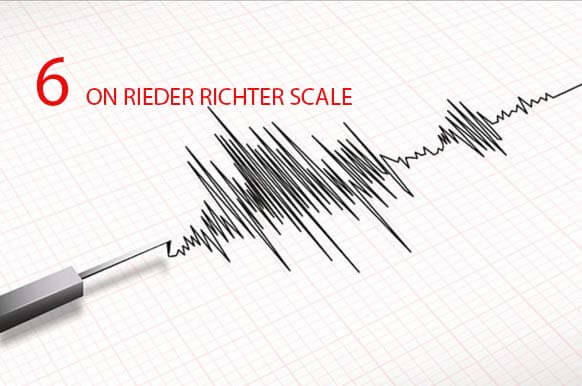
But in the here and now, the United States has suffered its first World Championships defeat in the 200 IM since 2001. U.S. men have just two individual golds this week, both belonging to Dressel, and barring upsets from Kalisz in the 400 IM or Ryan Murphy in the 200 back, no other U.S. man will stand atop the podium.
A surprising letdown for a big favorite makes this a 6 on the Richter scale.
An amazing finish for Hungary’s Boglarka Kapas in the women’s 200 fly earned her the forever title of World Champion and a third gold for Hungary this week with Katinka Hosszu owning more chances to come. But the shocked post-race look on the faces of Americans Hali Flickinger and Katie Drabot said it all: What just happened?
Kapas had won it in 2:06.78, ahead of Flickinger in 2:06.95 and Drabot in 2:07.04. In comparison, Flickinger swam a time of 2:06.25 in the semifinals after a 2:05.95 in prelims, while Drabot had been as fast as 2:06.59 in semis. Moreover, two years ago in Budapest, a 2:06.02 was required just to win a medal.
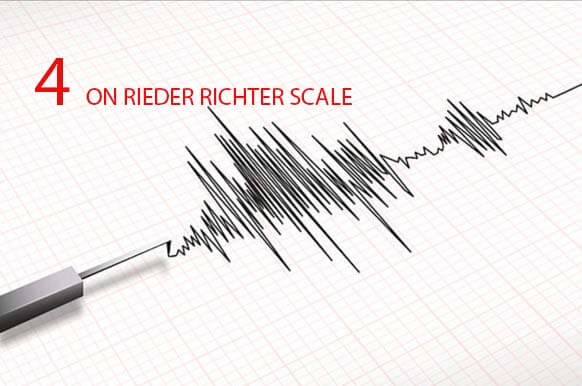
After a few moments, both Flickinger and Drabot seemed to celebrate in their accomplishments, the first major international medal for each one. But perhaps alongside that pride, a twinge of regret for a golden opportunity lost. The 200 fly has trended recently towards unpredictability, so it’s unclear what turns the event will take next year and beyond, even in the United States.
But in all, few major ramifications will result from this wild finish, and on a night with a focus on shiny suit records, Liu Zige’s 2:01.81 still looks a universe away. Thus, the women’s 200 fly records a Richter scale 4.
The non-Olympic women’s 50 back fails to make much seismic impact on the wider dialogue in swimming, but give credit to Olivia Smoliga for a breakthrough meet and deserved first long course world title. Behind Smoliga’s victory and bubbly reaction, bronze medalist Daria Vaskina of Russia appeared utterly shocked to have made her way onto a medal podium. This checks in with a 2.
In semifinal action, Australia’s Matthew Wilson’s world record-tying 200 breast opens some eyes as Wilson successfully backed up his 2:07.16 breakthrough earlier this year to make himself into a real title contender. But beating Anton Chupkov in the final remains a tall task, with Chupkov capable of finishing speed foreign to anyone else in the competition. For now, Wilson’s world record records a 4.
Finally, chaos surrounding Lilly King’s disqualification in the women’s 200 breast took more than eight hours to resolve. Unfortunately, the perfect camera which would confirm or overturn the call seems not to exist, as both overhead and underwater shots fail to show an infraction.
King def hits with both hands @fina1908. Bad call. Real bad call. pic.twitter.com/fynohbdpkC
— Kristy Kowal (@KristyKowal) July 25, 2019
The situation has seemingly passed, with King out of the mix for a 200 breast final where she should have been right in the hunt for a medal and perhaps even gold. Another day and yet more outside-the-pool drama at these World Championships records a 6 on the scale.
.jpg)

- 2017 WORLD CHAMPIONSHIPS
- OFFICIAL MEET PAGE
- WATCH RACE VIDEOS
- LIVE STREAM
- DAY 1 SWIMMING RESULTS
- DAY 2 SWIMMING RESULTS
- DAY 3 SWIMMING RESULTS
- DAY 4 SWIMMING RESULTS
- DAY 5 SWIMMING REULTS
- DAY 6 SWIMMING RESULTS
- DAY 7 SWIMMING RESULTS
- DAY 8 SWIMMING RESULTS
- RESULTS FOR ALL AQUATIC SPORTS
- DAY 8 PRELIMS HEAT SHEETS
- DAY 8 FINALS START LISTS
- FORM Swim for Coaches
- FORM Swim Sponsorships
- FORM Swim Contests
- FORM Swim Media




Wilson’s world record a 4 ? Hahahahah. Funny